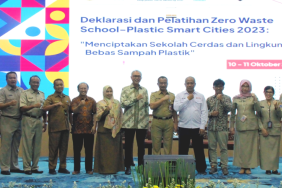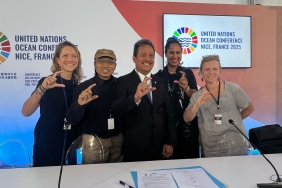TURKISH MAYOR VISITS JAKARTA TO EXCHANGE KNOWLEDGE ON INCLUSIVE APPROACH TO WASTE MANAGEMENT
Jakarta, April 30, 2025 - A high-level delegation from Türkiye led by Mayor Şahinbey (Gaziantep) has completed a three-day study visit on April 22-24, 2025, to Jakarta to learn from each other about inclusive approaches to waste management, with a particular focus on strategies that integrate informal waste workers into the formal waste management system.
"Indonesia's approach to community-based waste management systems not only addresses the environmental challenge of plastic waste, but also recognizes the important role of informal waste workers in the recycling value chain - this is also very important for Şahinbey," said Mehmet Tahmazoğlu, Mayor of Şahinbey..
With a population of over one million, Şahinbey is the main district of Gaziantep City, the third largest city in Türkiye. Since 2024, Şahinbey has been working with WWF-Türkiye on a three-year EU project aimed at improving the quality of life of waste workers by formally integrating them into the city's waste management system.
"Within the framework of the Zero Waste Project initiated by the Ministry of Environment and Urbanization, Şahinbey has made great progress in the field of recycling. Through this project, the first of its kind in Türkiye, we want to move forward so that waste workers, who carry the burden and future of the world, can get more decent and healthy working conditions and be professionally recognized," added Mayor Şahinbey.
The delegation met with the Mayor of North Jakarta, whose area was designated by the Ministry of Environment as a pilot site for the National Roadmap for Waste Management. WWF-Indonesia, as a partner in this roadmap, will support North Jakarta through education programs, public campaigns, and the implementation of best practices in waste management infrastructure that can transform the plastic waste management system in Indonesia.
"We are honored to share our experience with our friends from Türkiye and proud that our community-based approach has been recognized. This success comes from cross-sector collaboration in the waste value chain. By connecting local governments with small businesses and community organizations, we recognize that informal waste workers are custodians of the environment who deserve dignified working conditions," said Ali Maulana Hakim, Mayor of North Jakarta, during the meeting.
Both Mayors emphasized the importance of a holistic approach to tackling plastic pollution - from upstream to downstream - and expressed commitment to continue cooperation and knowledge sharing in building more sustainable and inclusive waste management systems in their respective regions.
"To truly tackle plastic pollution, we must simultaneously reduce the production of plastic waste and improve existing waste management systems. One of the key lessons we took home was the importance of strengthening waste collection systems, from proper segregation at the household level to storage and transportation infrastructure. These elements, which are often overlooked, are critical to the success of plastic waste recycling," added Mayor Şahinbey.
The visit included a tour of several facilities such as Lapak UD Mulia Jaya, Kumala Main Waste Bank (which won the National Best Waste Bank award from the Ministry of Environment and Forestry in 2024), TPS3R Joe, Lapak Gudang 45, and Waste4Change Supplier Point.
These facilities demonstrate different models of integration of waste pickers into the formal waste management system, which provides them with stable income, better working conditions, and social recognition.
"This knowledge exchange demonstrates the power of international collaboration in addressing environmental challenges," said Aditya Bayunanda, CEO of WWF-Indonesia. "Through Plastic Smart Cities, we see that a holistic approach is needed to reduce plastic leakage into nature. We must reduce single-use plastics and their production, while improving sorting, collection and recycling infrastructure. In Indonesia, we cannot ignore the role of the informal sector in waste management. By integrating them in this comprehensive strategy, we will not only increase recycling rates and reduce plastic leakage into nature, but also significantly improve their welfare."
CEO of WWF-Türkiye echoed similar sentiments: "This visit is an important step in our efforts to develop a potentially widely applicable solution to plastic pollution in Gaziantep. What we learned will be directly applied in an EU-funded project to improve the working conditions of waste pickers and integrate them into the legal framework. The success stories we witnessed in Jakarta prove that environmental protection and social inclusion can go hand in hand, especially if we address the entire plastic value chain, from production to disposal."
Finished
For further information, please contact
Karina Lestiarsi, Communication Officer WWF-Indonesia
klestiarsi@wwf.id/ 0852-1816-1683
About WWF Indonesia Foundation
WWF-Indonesia is a civil society organization with local legal entity and global network, supported by more than 100,000 supporters. Our mission is to stop the degradation of the earth’s natural environment and to build a future in which humans live in harmony with nature, by conserving the world's biological diversity, ensuring that the use of renewable natural resources is sustainable, and promoting the reduction of pollution and wasteful consumption. For the latest news, visit www.wwf.id and follow us on X (Twitter) @WWF_id | Instagram @wwf_id | Facebook WWF-Indonesia | Youtube WWF-Indonesia




